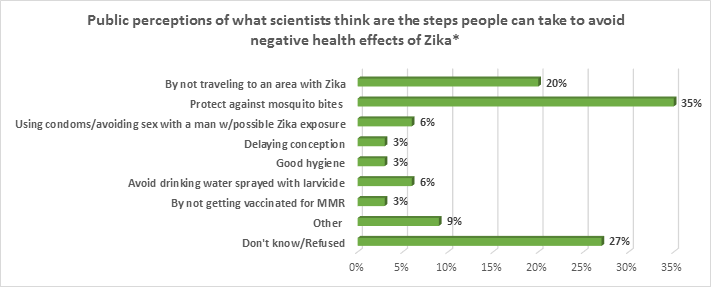Only 1 in 3 Americans says that protecting against mosquito bites is a step that scientists think people can take to avoid the negative health effects of Zika virus, a survey from the Annenberg Public Policy Center (APPC) of the University of Pennsylvania has found.
In response to an open-ended, unaided question on the weekly Annenberg Science Knowledge (ASK) survey, just 35 percent of respondents correctly said that scientists think that people can avoid the negative health effects of Zika by protecting against mosquito bites. Only 20 percent said “not traveling to an area with Zika,” and six percent suggested the use of condoms or not having sex with a man who may have been exposed to Zika. Multiple answers were permitted.
The Zika virus is primarily transmitted by the Aedes mosquito, and the Centers for Disease Control and Prevention (CDC), has emphasized the avoidance of mosquito bites in its public education campaign. Zika also can be sexually transmitted by men who are infected with the virus. The CDC has recommended condom use or the avoidance of sex with men who may have been exposed to Zika.
“On ways to protect from Zika, public knowledge is nowhere near where it needs to be,” noted Kathleen Hall Jamieson, director of APPC. “As mosquito season approaches in large swaths of the country, the media need to up their efforts to communicate key messages from the CDC and the National Institutes of Health about avenues of transmission and prevention.”
The phone survey of 1,009 U.S. adults was conducted from April 28-May 2 and has a margin of error of +/-3.7 percent. Despite the lack of knowledge about Zika prevention, 82 percent of respondents said that scientists think it is likely that Zika is transmitted by mosquitoes, and 74 percent said that they routinely take precautions to avoid mosquito bites.
The Zika virus presents a particular risk to pregnant women. The CDC has said that “based on current knowledge, the greatest risk for complications from Zika is to a pregnant woman’s fetus” since a woman can pass the virus to her fetus. The CDC has said that pregnant women “should avoid travel to any area with Zika.”
Women significantly more aware of Zika-microcephaly link than men
The CDC confirmed Zika as a cause of microcephaly and other severe fetal brain defects last month. Over the course of three subsequent APPC surveys, from April 14-May 2, 77 percent of the respondents said it is accurate that a pregnant woman infected with Zika is more likely to have a baby with an unusually small head and brain. (This analysis relied on surveys conducted among a total of 3,031 U.S. adults, with a margin of error of +/-2.1 percent.)
Women were significantly more likely than men (80 percent vs. 75 percent) to say that the Zika-microcephaly link was accurate, according to an analysis that controlled for a variety of factors. But people age 18 to 50 were significantly less likely (74 percent vs. 81 percent) than people age 51 or older to see the Zika-microcephaly link as accurate. In addition, those with a college degree or higher were significantly more likely than those with less education (85 percent vs. 74 percent) to say that the Zika-microcephaly link was accurate.
Public perceptions of steps scientists think people can take to avoid Zika’s effects

In the current week’s survey of 1,009 people, when asked what scientists think people can do to avoid the negative health effects of Zika:
- 35 percent said taking steps to protect against mosquito bites such as using insect repellent and screens, removing standing water, and wearing protective clothing. (CDC tips on controlling mosquitoes are here. The CDC recommends using EPA-registered insect repellents.)
- 20 percent said by not traveling to an area with Zika. (The CDC has recommended that pregnant women avoid travel to any area with Zika.)
- 6 percent said by using condoms or avoiding sex with a man who lives in or travels to an area with Zika. (The CDC says that condom use can prevent Zika from being passed on.)
- 6 percent said avoiding drinking water sprayed with larvicide. (Debunking a false rumor, the CDC said the pesticide pyriproxyfen “has not been linked with microcephaly.”)
- 3 percent said delaying conception/delaying pregnancy.
- 3 percent said good hygiene.
- 3 percent said by not getting vaccinated for MMR (measles, mumps and rubella). (There is “no evidence that vaccines cause microcephaly in babies,” according to the World Health Organization.”)
What do people do to protect against mosquitoes?
Among the 74 percent of people who said they routinely take steps to protect themselves against mosquitoes, when asked if they did any of the following:
- 79 percent said they remove standing water;
- 72 percent said they wear insect repellent;
- 71 percent said they replace or repair window screens;
- 59 percent said they wear long-sleeved shirts or other protective clothing outdoors;
- 56 percent said they avoid activities that would bring them in contact with mosquitoes;
- 16 percent said they use mosquito netting.
The Zika outbreak was reported last year in Brazil and has spread through Latin America. As of May 4, there were 472 travel-associated cases of Zika in the continental United States, 44 involving pregnant women and 10 involving sexual transmission, according to the CDC.
APPC’s surveys were conducted by the research firm SSRS. For more about the questions and data, see the Appendix. To download the release, click here.

